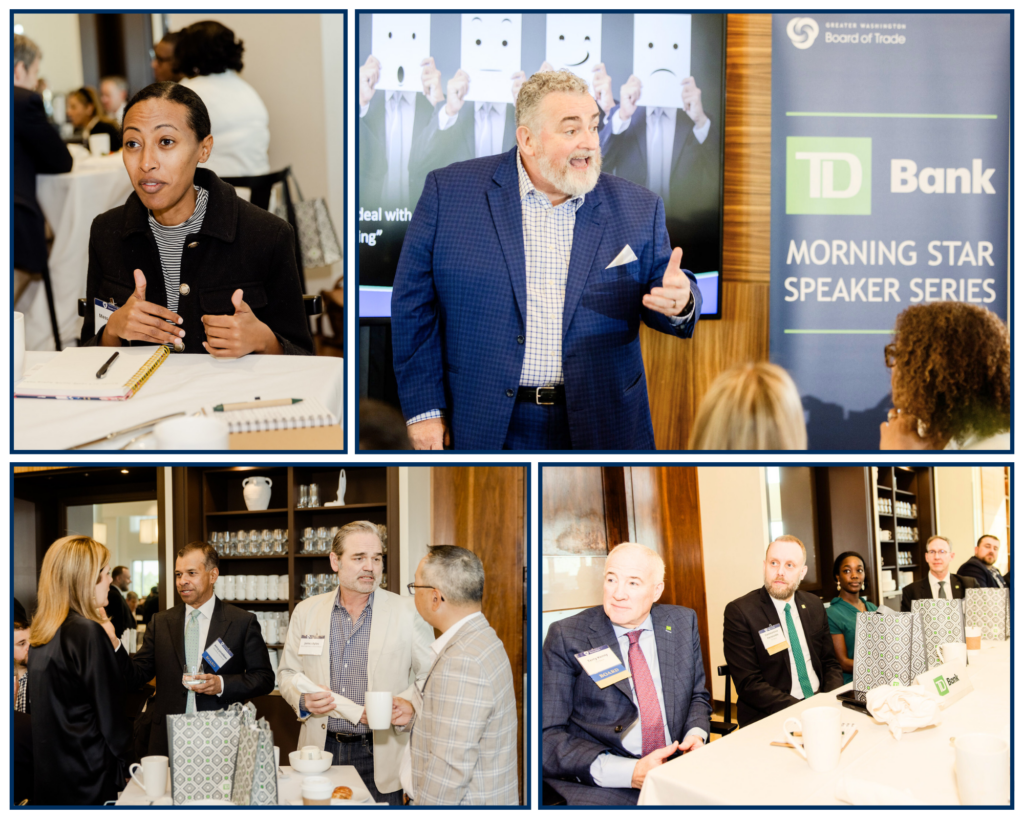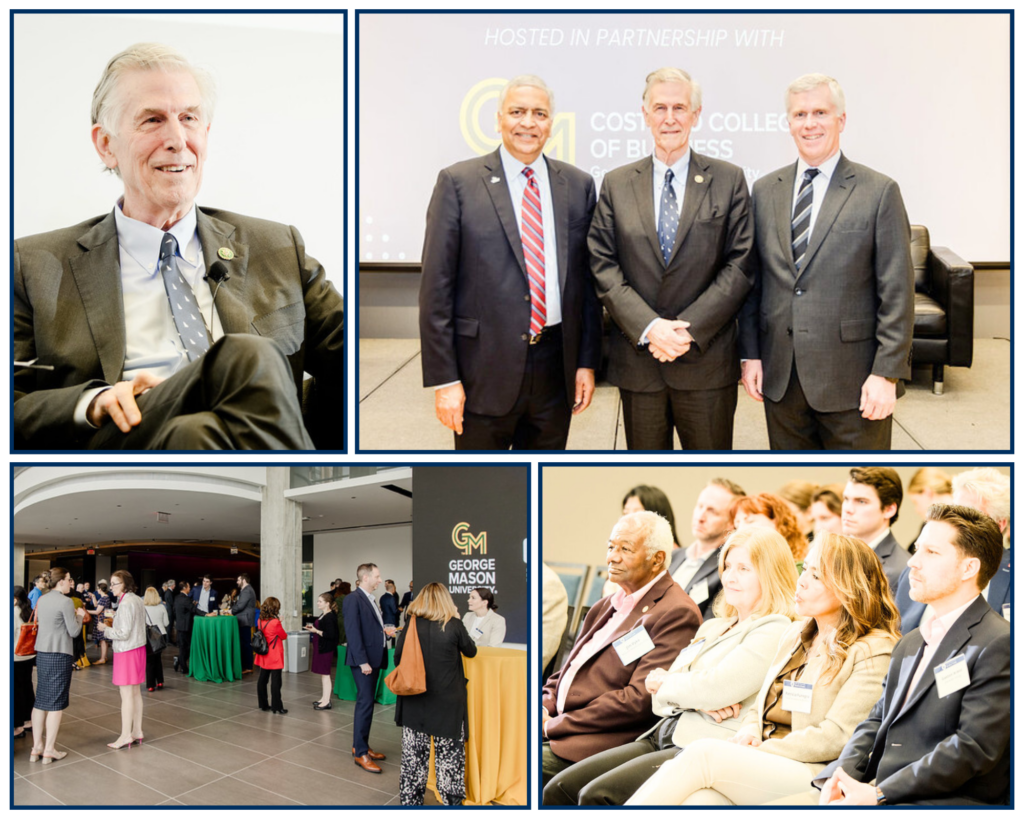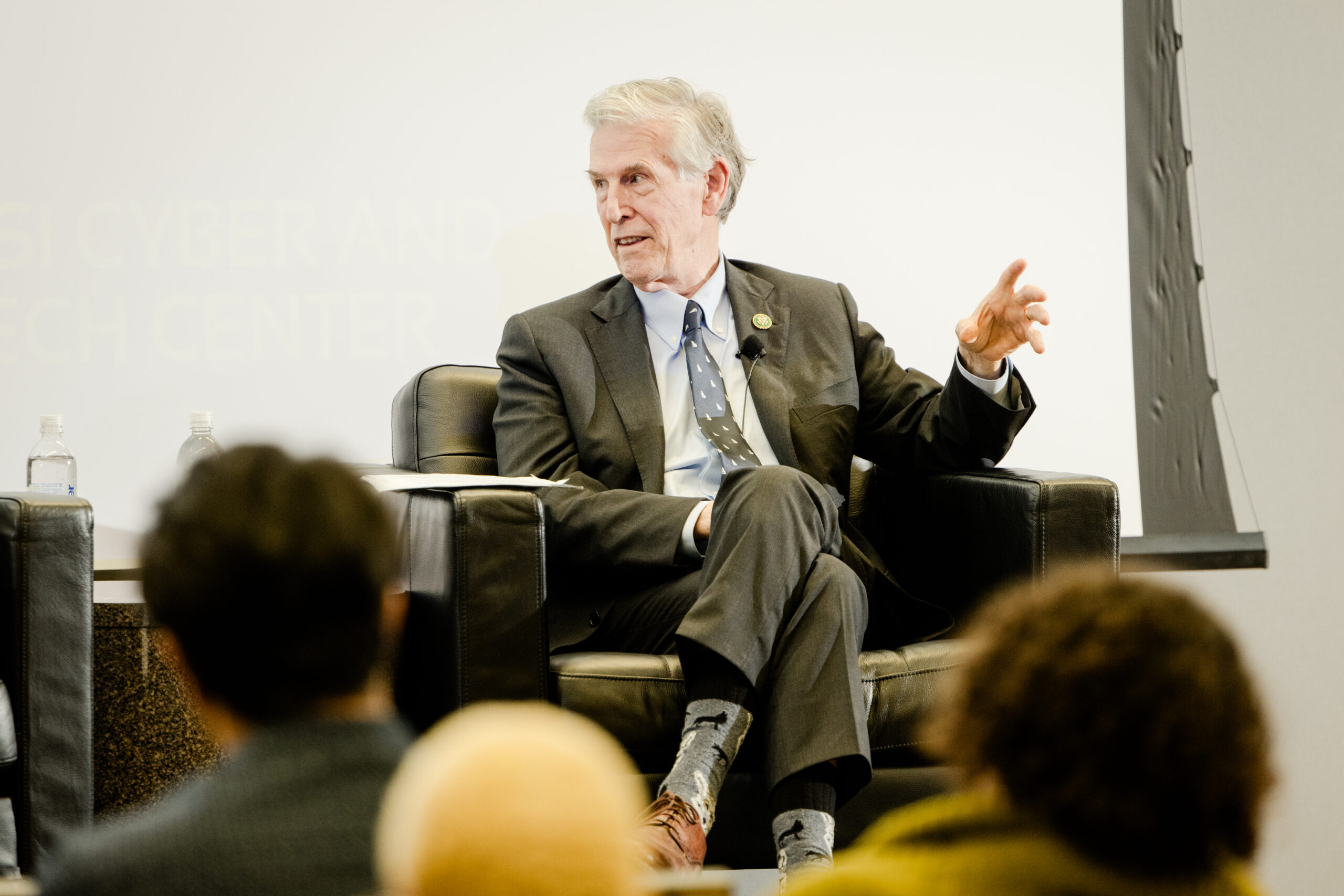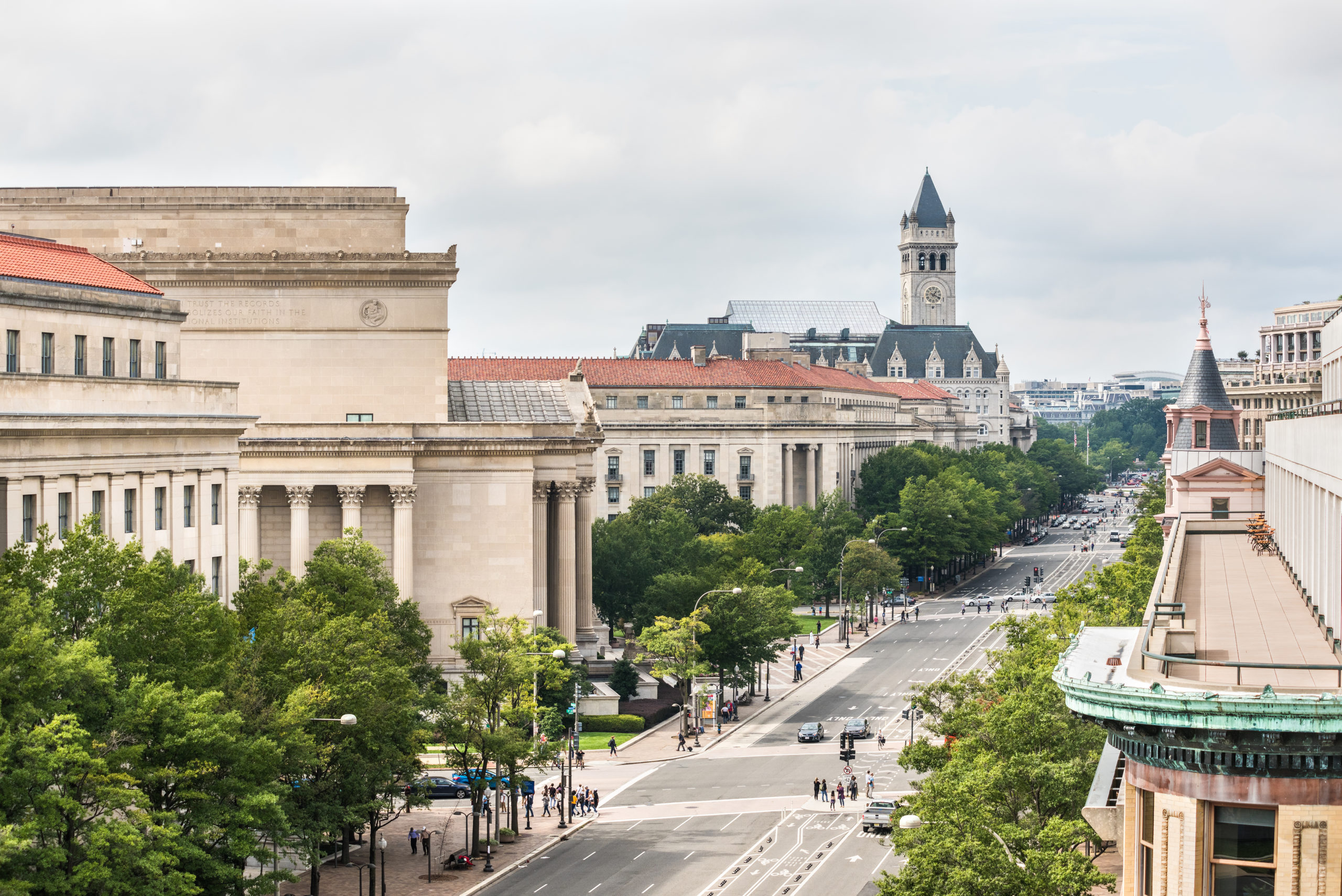The Board of Trade remains focused on advancing the priorities that matter most to Greater Washington. This March newsletter shows a variety of engagements we have had across the region with members and public officials, while also showcasing meaningful updates on priorities we are following in the region. We also have a variety of member news updates that showcase regional collaboration!
Category: Latest Updates
TD Bank Morning Star Speaker Series: Strategic Leadership & Emotional Intelligence Workshop
The Board of Trade kicked off its 2025 TD Bank Morning Star Speaker Series with an energizing workshop centered on “Strategic Leadership & Emotional Intelligence,” held April 23 at the Salamander Hotel in Washington, D.C. The interactive event set the tone for the year’s programming with a deep dive into emotional intelligence as a cornerstone of effective leadership.
The featured speaker, Dr. Irvine Nugent, an internationally recognized expert on emotional intelligence and nonverbal communication, brought his decades of experience to life with an engaging, hands-on session that encouraged participants to reflect on how they show up as leaders. Drawing from real-world scenarios and guided exercises, attendees explored how empathy, self-awareness, and emotional regulation can elevate not only individual performance but also team cohesion and organizational outcomes.
“Leadership is not just about strategy; it’s about connection,” Dr. Nugent emphasized. “And connection starts with understanding yourself and others.”
Attendees were invited to explore emotional triggers, practice mindfulness techniques, and engage in peer-based activities that fostered vulnerability and trus, which an approach that mirrors the “Unexpectedly Human” ethos that TD Bank weaves into its community partnerships.
The overarching takeaways from this immersive workshop with Dr. Nugent helped leaders:
- Assess and enhance self-awareness, adaptability, and decision-making
- Foster trust and collaboration to lead high-performing teams
- Engage in peer-driven exercise to refine leadership presence

VIEW MORE PHOTOS FROM THIS EVENT
The Morning Star Speaker Series is designed to go beyond traditional lectures. Each session offers immersive, skills-based experiences tailored to empower regional leaders. This year’s lineup reflects a commitment to holistic leadership development, combining personal growth with practical tools that attendees can immediately apply in their organizations.
These programs aim to equip business leaders with the self-awareness and agility needed to thrive in today’s evolving regional economy.
Stay connected with the Board of Trade to register for future sessions and learn how the Morning Star Speaker Series continues to inspire and elevate leadership in Greater Washington.
Upcoming sessions in the 2025 series include:
-
June 2025 – Leadership Decision-Making Through Culinary Teamwork: An interactive kitchen experience that simulates high-pressure decision-making and team dynamics.
-
Fall 2025 – NextGen Leadership Storytelling: A workshop exploring the art of authentic storytelling to strengthen executive presence and professional influence.
Thank you to TD Bank for sponsoring this vital speaker series that engages our members and partners in the Greater Washington region.

From the Classroom to Congress: Don Beyer discusses the future of Artificial Intelligence
The Board of Trade hosted a dynamic and thought-provoking fireside chat on artificial intelligence featuring Virginia Congressman Don Beyer and Jamil Jaffer, Founder & Executive Director of the National Security Institute at George Mason University.
The conversation focused on the future of AI policy, innovation, and the balance between rapid technological advancement and the need for safety, trust, and governance. Congressman Beyer — who is currently taking graduate-level courses on AI at George Mason University to understand the field better — spoke about his commitment to informed policymaking and his sponsorship of the bipartisan CREATE AI Act, which seeks to expand access to AI research tools across the country.
The conversation also explored critical issues such as national security (including how AI technology is increasingly being integrated into our defense systems), the importance of balanced federal oversight that supports both developers and end users, and the potential implications of AI on key sectors like infrastructure and financial markets.

VIEW MORE PHOTOS FROM THIS EVENT
Congressman Beyer has been involved in AI policy issues at the congressional level for some time now. He discussed his leadership in advancing the AI Foundation Model Transparency Act and his ongoing work with the House Task Force on AI. Beyer has also been a part of other AI-focused Congressional bodies, including the AI Caucus and the AI Working Group.
In a truly engaging moment, both students and business professionals had the opportunity to ask Congressman Beyer direct questions about the implications of AI for industry, public policy, and workforce development. The exchange highlighted the critical importance of cross-sector collaboration as the technology continues to evolve.
Thank you to everyone who joined us for this important conversation on one of the most transformative technologies of our time. Stay tuned for more events at the intersection of innovation and policy.
THANK YOU TO OUR SPONSORS FOR SUPPORTING THIS EVENT

Testimony to DC Council: Workforce Strategies Must Support Economic Growth and Resilience
About this Testimony: The Greater Washington region is at a pivotal moment when it comes to workforce development. Shifts in the federal employment landscape, combined with long-standing challenges around talent access and equitable opportunity, demand a bold, coordinated response. On behalf of the Board of Trade, President and CEO Jack McDougle delivered the following testimony to the D.C. Council’s Committee on Executive Administration and Labor. His remarks emphasize the need for a modern, regionally aligned workforce system, one that bridges gaps between employers and talent, supports economic resilience, and ensures D.C. residents and businesses can thrive in a rapidly evolving economy.
Chairperson Anita Bonds and members of the Committee,
Thank you for the opportunity to testify on behalf of the Greater Washington Board of Trade. My name is Jack McDougle, and I am President and CEO of the Board of Trade. Founded in 1889, we represent hundreds of employers—with thousands of workers— across the Washington region who rely on a skilled, adaptable, and inclusive workforce to compete—and who are committed to helping strengthen the workforce in the District and throughout the metro area.
Workforce challenges aren’t new. This region has long been home to one of the most highly educated and skilled workforces in the country. We have some of the best universities, research institutions, and federal expertise anywhere. But employers still struggle to find the right talent at the right time. And too many residents still face barriers to getting their foot in the door.
Now, those long-standing challenges are intersecting with something bigger and more immediate.
The federal government—long the backbone of our regional economy—is changing. Telework, digitization, automation, and agency consolidation are reducing the federal footprint, especially in downtown D.C. That’s affecting not just jobs, but office occupancy, small business vitality, and city revenues. Thousands of workers are being displaced or restructured, many of them with valuable skills—but without a clear path forward. Meanwhile, many D.C. residents are still disconnected from the workforce entirely.
So, we’re facing a multi-sided problem: how to help people enter the workforce, how to help experienced professionals transition into new roles and how to attract and retain the talent we need to compete.
Solving this isn’t just about creating more training programs. It’s about building a coordinated, regional system that connects people to opportunity—wherever the job is—and helps employers find talent—wherever that talent lives.
Why a Regional Approach Matters
The District lies at the economic center of a much larger labor market. Roughly two-thirds of jobs in D.C. are held by people who live in Maryland or Virginia. At the same time, tens of thousands of District residents commute to jobs outside the city every day.
If we’re serious about increasing economic opportunity for D.C. residents, we can’t limit our thinking to only jobs within city limits. Likewise, if we want to strengthen D.C.’s job base and bring people back into our downtown corridors, we need to make it easier for talent across the region to access those jobs.
This requires a level of policy alignment, data sharing, and joint investment that we simply do not have today.
Some progress is underway. Virginia’s G3 program, for example, offers tuition-free community college in high-demand fields like IT, healthcare, and skilled trades—paired with employer engagement. Maryland is investing in apprenticeship expansion and industry-led partnerships through its Employment Advancement Right Now (EARN) initiative.
Virginia has also taken steps to streamline its workforce system by consolidating dozens of fragmented programs under the purview of the newly established Virginia Office of Education and Labor, with the goal of improving coordination, reducing duplication, and aligning training more directly with employer needs.
And in D.C., we’re seeing promising models too—like the Infrastructure Academy’s partnerships with Pepco and WMATA to prepare residents for real jobs in energy and transportation. But we need more coordination across the region, and better data to guide investment.
What the Council Can Do
Here are five ways the District can lead in FY26—and help build a workforce system that reflects how people live, work, and move across this region.
- Support a Regional, Data-Driven Workforce Strategy
Our region lacks a shared, real-time understanding of workforce supply and demand. Employers, educators, training providers, and governments all make decisions based on partial or outdated information. We strongly urge the District to partner with neighboring jurisdictions—Maryland, Virginia, and regional planning bodies—to develop a unified baseline of current labor market conditions. This should include disaggregated data by industry, occupation, skills, demographics, and geography.
Such a baseline would allow all of us to align efforts, avoid duplication, target investment, and measure progress consistently.
Recommendation:
Support the creation of a Regional Workforce Intelligence Hub, in partnership with MWCOG, Consortium of Universities, the Workforce Investment Council, and workforce leaders in Maryland and Virginia.
- Helps align training programs with actual job demand
- Track skill gaps and mobility across jurisdictions
- Provides clear, actionable data for jobseekers, employers, and policymakers alike
This is core infrastructure for smarter decisions and stronger outcomes.
- Expand Employer-Led Training with Cross-Jurisdiction Portability
We need to move even further beyond traditional classroom models and embrace demand-driven, work-based learning. The Council can promote public-private partnerships that create apprenticeships, industry bootcamps, and employer-sponsored credentials—especially in high-growth sectors like IT, clean energy, healthcare, and advanced manufacturing.
Recommendation:
Invest in Workforce Innovation Grants that support partnerships between employers and training providers focused on:
- Industry-designed curricula
- Paid apprenticeships and bootcamps
- Credentials recognized across D.C., Maryland, and Virginia
- Reducing administrative barriers for employer participation
This builds on successful approaches already in motion. We’ve seen how employer-driven programs at UDC, the Healthcare Workforce Partnership, and the Tech Apprenticeship Program at Northern Virginia Community College can deliver talent that’s job-ready from day one.
- Launch a Federal Workforce Transition Program
Thousands of federal and contractor workers are being impacted by the ongoing restructuring. Many have transferable skills—but need targeted support to pivot into new fields.
Recommendation:
Create an integrated Federal Transition Upskilling Program to provide:
- Training in high-demand private-sector fields (e.g., cybersecurity, project management, clean energy)
- Career coaching and job placement support
- Incentives for regional employers to hire transitioning talent
This helps retain experienced professionals in the region and prevents talent loss from the city’s core.
- Invest in Wraparound Supports for Jobseekers
Access to training is meaningless if people can’t show up. We hear this all the time from employers and community partners—people are ready to work but face real barriers.
Recommendation:
Prioritize supports that make workforce participation possible:
- Childcare for jobseekers and trainees
- Free or subsidized Metro, MARC, VRE or other mobility access
- Navigation and coaching services that help residents see—and pursue—what’s possible across the region
These supports may seem small, but they’re game-changers for residents balancing work, family, and training.
- Strengthen the District’s Workforce Infrastructure
The District’s workforce system needs to be agile, integrated, and built to partner—both internally and across borders. We encourage the Council to break down silos—between workforce, education, economic development, and human services—and between the District and its regional peers. The economic fate of this region is shared. No single jurisdiction can go it alone.
Recommendation:
Further support DOES and the Workforce Investment Council to:
- Modernize operations and digital tools for job matching and tracking
- Improve coordination across education, training, and economic development
- Evaluate long-term outcomes—not just short-term placements
This ensures our systems are working smarter, not just harder.
Conclusion: Shared Workforce, Shared Responsibility
The workforce challenges we face—recruitment, retention, displacement, inequity, skills misalignment—don’t stop at jurisdictional borders. Our solutions can’t either.
The District has a chance to lead—not only in reimagining how we support residents and businesses, but in showing what regional collaboration can look like when it’s done right.
Let’s connect the dots between employers, workers, and opportunity—no matter where they’re starting from. Let’s build a workforce system that reflects how people actually live and work across the region.
Sincerely,
Jack McDougle
President & CEO
Greater Washington Board of Trade
See Additional Testimonies and Letters of Support we have submitted recently:
Letter of Support: ‘Local Funds Act of 2025’ Protects DC’s Authority to Spend Locally Raised Revenue
Testimony: Submitted to DC Council, Committee on Business & Economic Development
Letter to Congress: Addressing Concerns with House Concurrent Resolution 14
Congress Should Preserve DC’s Home Rule and Withdraw the Bowser Act | WBJ Viewpoint
Letter of Support: ‘Local Funds Act of 2025’ Protects DC’s Authority to Spend Locally Raised Revenue
About this Letter of Support: Greater Washington Board of Trade President & CEO Jack McDougle submitted testimony to the United States House of Representatives showing strong support for the District of Columbia Local Funds Act of 2025 (S. 1077), a bipartisan bill that protects D.C.’s authority to spend its locally raised revenue, without cost to the federal government. Passage of this legislation is essential to preventing a $1.1 billion budget shortfall and ensuring continued funding for core public services that underpin the economic health of the District and the entire metropolitan region. The following testimony outlines the business community’s position and the critical importance of timely congressional action.
Dear Mr. Speaker (Mike Johnson) and Representative Hakeem Jefferies,
On behalf of the Greater Washington Board of Trade — representing the business community of the D.C. metropolitan region since 1889 — I write to express our strong support for the District of Columbia Local Funds Act of 2025 (S. 1077).
This bipartisan legislation, which passed the Senate unanimously on March 14, affirms D.C.’s authority to spend its locally raised revenues and averts an immediate $1.1 billion budget shortfall. It is essential to sustaining the economic stability of the District and the broader regional economy. We urge the House to pass this bill without delay.
The District raises the vast majority of its revenue independently—there is no cost to the federal government. In fact, the Congressional Budget Office confirms that S. 1077 has no impact on the federal budget. What it does do is allow the District to implement its Fiscal Year 2025 budget, which Congress already approved through continuing resolutions in September and December (P.L. 118-83 and P.L. 118-158).
These funds are critical to the operation of public services and infrastructure that underpin D.C.’s and the region’s economic health — transportation, public safety, healthcare, education, and more. Without them, the resulting budget gap would ripple across the region, weakening consumer confidence, shrinking business revenue, and putting jobs at risk. The impact wouldn’t stop at the District’s borders — it would affect the entire regional economy, including D.C.’s 700,000 residents and the nearly 26 million visitors who came to the nation’s capital last year.
From retail and real estate to hospitality and professional services, businesses across sectors would feel the blow. Abrupt cuts at this scale would increase costs, slow investment, and threaten the momentum of recovery and growth – especially needed as efforts continue to transform the federal government.
We fully support the importance of fiscal responsibility, including reducing the national debt. But for over two decades, every continuing resolution has included language allowing D.C. to spend its own locally passed, balanced budget. This year should be no different.
Economic strength in the Greater Washington region is not just a local issue — it’s a matter of national importance. Congress must give the District the certainty it needs to manage its finances and sustain the services that drive this region forward.
We respectfully urge you to support S. 1077, and we stand ready to work with you to keep our region strong, stable, and growing.
Sincerely,
Jack McDougle
President & CEO
Greater Washington Board of Trade
See Additional Testimonies and Letters of Support we have submitted recently:
Testimony to DC Council: Workforce Strategies Must Support Economic Growth and Resilience
Letter to Congress: Addressing Concerns with House Concurrent Resolution 14
Testimony: Submitted to DC Council, Committee on Business & Economic Development
Congress Should Preserve DC’s Home Rule and Withdraw the Bowser Act | WBJ Viewpoint
Courageous Leadership: Navigating Uncertainty & Taking Bold Action with Dr. Margie Warrell
Leadership, at its core, isn’t about having all the answers. It’s about having the courage to act, even in the face of uncertainty. That message resonated deeply during a recent professional networking event hosted by the Board of Trade and Ridgewells Catering, where local executives and rising professionals gathered for a powerful roundtable discussion led by Dr. Margie Warrell, bestselling author of The Courage Gap, and Susan Lacz, CEO and Hospitality Maven of Ridgewells.
Held at Ridgewells’ renovated Bethesda headquarters, the event featured an engaging and candid conversation on the role of fear, resilience, and decision-making in leadership. Dr. Warrell and Lacz shared personal stories and actionable strategies for navigating challenges and stepping outside your comfort zone, with insights especially relevant in today’s fast-changing business climate.

VIEW MORE PHOTOS FROM THIS EVENT
This discussion emphasized that real leadership is fueled by clarity, not certainty. Whether you’re making high-stakes decisions or managing day-to-day operations, the ability to act decisively while embracing discomfort can set great leaders apart. Attendees left with fresh perspectives on how to turn hesitation into opportunity and how to lead with greater impact at every level.
Guests also enjoyed a warm atmosphere of networking and connection over beautifully crafted hors d’oeuvres and drinks, provided by Ridgewells’ talented culinary team. More than just an evening of inspiration, the event underscored the value of community and the importance of creating space for open, honest conversations around leadership.
The night served as a bold reminder: courage isn’t the absence of fear; it’s the decision to move forward in spite of it.
Thank you to our member, Ridgewells Catering, for partnering with the Board of Trade for this event.
Watch the full discussion between Susan Lacz and Dr. Margie Warrell below:
Greater Washington Federal Workforce Resource and Support Guide
The Greater Washington Board of Trade has launched a Federal Workforce Resource & Support Guide to assist regional professionals affected by federal layoffs. This guide provides valuable resources, job transition support, and networking opportunities to help impacted workers navigate career changes and connect with new opportunities in the region’s dynamic economy.
Below is a look at upcoming job fairs and a variety of resource links from localities in the region that can help workers facing layoffs.
Explore data insights on how federal layoffs impact communities in our region from our partners at the Metropolitan Washington Council of Governments.
Upcoming Federal Workforce Job Fair Opportunities
May 3 – Job Fair For Federal Workers and Contractors
Congressman Don Beyer, in partnership with the City of Alexandria, the City of Falls Church, Arlington County and Fairfax County, invites all federal workers and interested jobseekers to attend a networking and hiring fair. The event featured participation from nearly 50 companies across tech, healthcare, and local government, with breakout sessions led by current and former federal employees, on-site headshot and resume services, and comprehensive wrap-around support including housing and workforce development assistance.
May 1 – Maryland Workforce Association Statewide Virtual Job Fair 2025 for Federal Employees and Contractors
State-wide employment event organized by the Maryland Workforce Association in association with the Maryland Department of Labor and the American Job Center & Workforce Development agencies in Maryland. This Virtual Job Fair has been organized in support of Federal Employees & Contractors seeking new career options and transitioning from their previous work involving the Federal Government. All jobseekers are welcome!
Learn more and register here: https://bit.ly/3G0v1kZ
April 25 – Navigating New Beginnings: A Job Fair for Federal Employees
Join the Metropolitan Washington Airports Authority, in partnership with top DC-region employers, for a specialized job fair designed to support federal employees exploring new career opportunities. Connect with hiring managers from diverse industries, gain valuable career insights, and take the next step toward your professional future.
Learn more and register here: https://bit.ly/3G4IZ5j
April 16 – National Security Career Fair
Meet with dozens of high-level recruiters from top federal agencies and contractors working on the most pressing national security matters. Talk to representatives from the State Department, the intelligence community, and other Tier 1 and 2 agencies to fulfill your NSEP service requirement and have the chance to work on the most pressing national security matters.
Learn more and register here: https://bit.ly/4jfTVeK
April 10 – Transferable Jobs Skills Workshop: Thriving Beyond the Federal Workforce
Losing a job can be overwhelming, but your skills remain valuable! This workshop is designed to help former federal employees identify their transferable skills, build emotional resilience, and take proactive steps toward their next career opportunity.
Learn more and register here: https://bit.ly/4hWEbMI
April 2 – Howard County Federal Workers Career Fair
Exploring new career opportunities outside the federal workforce? Join employers at Howard County Community College for the Federal Workers Career Fair, designed to connect former federal employees with new career opportunities. Meet with hiring professionals, enhance your job search and take the next step in your professional journey.
Register Here: https://bit.ly/4ieCJq5
March 19 – Washington DC/MD/VA Metro Area Virtual Job Fair
Learn more and register here: https://www.hlpa.com/jobfairs/washington.html
March 18 – Loudoun JobFair for Public Service Opportunities
Over 20 + employers from various public service organizations will be available to speak with you and answer your employment-related questions. Register now for email updates and reminders with the latest on employer attendance and possible event delays or cancellations around inclement weather.
Register Here: https://www.loudoun.gov/jobfair
March 14 – DC Government Federal Hiring Event
On March 14th, the District Government will host an exclusive Hiring Event for individuals affected by federal layoffs. More information on participating employers, DC Government benefits, unemployment resources, and additional support can be found at fedsupport.dc.gov. Attendance is limited and available on a first-come, first-served basis.
March 13 – City of Alexandria: Transferable Skills Workshop | Thriving Beyond the Federal Workforce
Losing a job can be overwhelming, but your skills remain valuable! This workshop is designed to help former federal employees identify their transferable skills, build emotional resilience, and take proactive steps toward their next career opportunity.
Learn more & Register: https://bit.ly/4bGY1Kg
Job Transition & Unemployment Federal Workforce Resources
A variety of government officials at the state, county, and city level are providing resources that are helping federal workers in Greater Washington. These links are a valuable resource for residents, government employees, active military personnel and veterans, contractors, nonprofits, and businesses to navigate current and future challenges related to federal service changes, disruptions, or policy actions.
State/District Resource Pages
City & County Resrouce Pages
VIRGINIA
MARYLAND
Health & Wellness Federal Workforce Resources
As the current federal administration continues downsizing the its government workforce, affected employees will need to make crucial decisions regarding their healthcare coverage once their employment ends. Our partner and member WTOP spoke with officials that understand the complexities of healthcare coverage.
Read more and use helpful links from WTOP here: https://bit.ly/3FiEcwY
If you or someone you know is in crisis, call or text 988 to reach the Suicide and Crisis Lifeline or chat live at 988lifeline.org.
——————————————————————————————————————————————————————————————
ABOUT THE BOARD OF TRADE
The Greater Washington Board of Trade, founded in 1889, is the region’s premier non-partisan business organization representing industry, nonprofits, universities, and government agencies. The Board of Trade addresses complex and always-evolving business concerns that stretch across the District of Columbia, suburban Maryland and Northern Virginia, with a priority focus on inclusive economic growth, improving the business climate, and enhancing the region’s economic competitiveness.
POLICY ISSUES AND TOPICS THE BOARD OF TRADE IS FOLLOWING
- Beyond the Data: 2024 NAEP math results are alarming
- Looking Ahead: The Road to 2025 and Beyound for GWBOT Policy Team
- Virginia gubernatorial candidate Abigail Spanberger meets with Greater Washington’s business community
- Waterway Economics: Funding increases for region’s Post of Baltimore and Port of Virginia
- Testimony: Downtown Arena Revitalization Act of 2024 (DC B25-1004)
A Tradition of Impact: Reflecting on the 105th Mid-Winter Dinner
More than 700 members, public officials, and regional leaders joined the Greater Washington Board of Trade on March 26 for the 105th Mid-Winter Dinner — an evening grounded in connection and momentum.
Set within the breathtaking Washington National Cathedral, this year’s event blended elegance, tradition, and a shared commitment to the region’s future. Guests were treated to a moving performance by the National Philharmonic, a gourmet dining experience from Ridgewells Catering, and an atmosphere designed to inspire thoughtful conversation and lasting relationships.
The Mid-Winter Dinner is more than a celebration; it’s a cornerstone of regional leadership. For over a century, this signature event has brought together changemakers to reflect, refocus, and recommit to advancing the Greater Washington region. In a time when unity and collaboration are more important than ever, the evening served as a reminder of what’s possible when we come together with clarity, purpose, and shared resolve.
Let’s carry the spirit of Mid-Winter forward to strengthen connections, shape policy, and build a stronger, more resilient region for all.

View photos from the 105th Mid-Winter Dinner here
We extend our sincere gratitude to all our sponsors for helping make this signature event truly unforgettable.

Navigating airline travel programs for DC area business travelers
This is a partnership article between United Airlines and the Greater Washington Board of Trade to further efficient transportation and air travel in our region.
For D.C. area business travelers, United can help you save money and earn rewards
United is proud to call Washington Dulles International one of our seven U.S. hubs. From Dulles alone, we offer daily service to around 60 destinations in the U.S. and Canada and daily or weekly service to 40 international destinations. For business travelers in the Washington, D.C., area, we provide convenient access to major cities in the U.S. and beyond with daily nonstop flights from all three D.C. area airports.
United for Business connects business travelers to their next destination through United’s expansive route network, providing exclusive discounts and amenities. No matter the size of your organization, our program can make your business travel more affordable and enjoyable.
Travel options for businesses of all sizes
Working with airlines for business travel can help you maximize your travel budget. If you work for a large employer, your company may already have a travel program with an airline.
If you work for a small to midsize company, or if you own your own business, you might think you’re too small to partner with an airline – but that’s not the case. Companies that travel for business can benefit even more from airline travel programs by getting access to exclusive discounts and perks that make business trips better.
Business travelers in the D.C. area are invited to learn more about the travel programs available through United for Business. To start exploring with no obligation, just enter your work email.

Savings
Discounts are one of the main benefits of business travel programs and are usually based on travel volume as well as the airline’s route structures. If you have a travel program in place, you’ll get better rates that are negotiated based on the volume of travel.
Discounts can range between 3 and 5 percent, but larger discounts may be available on higher-class tickets or when the airline wants to build volume on routes. With United for Business, discounts are offered to you up front, no matter your spend with the airline.
If your business is smaller or midsized, you could try an “off-the-shelf” travel plan from United for Business. Those are based on specific travel needs, and are helpful if you’re looking to save money, provide your travelers with amenities, or a combination of both.
If you manage travel for your small to midsize business, the United for Business travel management portal is a convenient one-stop shop for booking team travel, setting policies like the maximum budget for a trip, managing forms of payment, tracking travel spend and more. With a holistic snapshot of how your organization spends on travel, saving becomes easier.

Rewards
Partnering with an airline can also get your team rewards to enhance your travel experience – and not just for C-suite employees. Through travel programs, business travelers have more opportunities to earn discounts on perks like access to airport clubs and lounges.
Loyalty program benefits, like those available through United MileagePlus, are one of the most common ways to earn rewards. It’s free for travelers to join MileagePlus® and earn miles to redeem on flights with United and our airline partners. Travelers can use miles for benefits like flight upgrades, lounge access, priority seating and preferred seating.

From D.C. to almost anywhere
As the airline with the most routes out of IAD, we can get you to the biggest business markets in the country with frequent daily service to San Francisco, Los Angeles, Denver, New York and London. We also serve travelers from all three D.C. area airports – Baltimore/Washington International Thurgood Marshall (BWI), Ronald Reagan Washington National (DCA) and Washington Dulles (IAD).
The largest airline network
United now has the largest and most diversified international route network among U.S. airlines. We offer service to more destinations across the Atlantic and Pacific than all U.S. carriers combined.
Our network reaches further through our alliances and strategic agreements with many of the world’s leading global airlines. We’re a founding member of Star Alliance, the world’s largest airline alliance with destinations in nearly 200 countries, which gives your travelers access to routes across the world.
You can usually book flights with Star Alliance airlines on united.com or the United app, if the flight is part of your United itinerary. Plus, you’ll still earn miles and status when you fly with most of our airline partners, just like you would when you fly United.

Learn More: Business travelers in the D.C. area are invited to learn more about the travel programs available through United for Business. To start exploring with no obligation, just enter your work email.
Letter of Advocacy: Maryland and Virginia must Prioritize Reconstruction of American Legion Bridge
About this Letter of Advocacy: This letter was sent to both Governor Wes Moore of Maryland and Governor Glenn Youngkin of Virginia to rally support for the reconstruction of the American Legion Bridge, which is a vital transportation asset to our growing region. The Board of Trade joined other Washington Region Transportation Coalition members as part of these advocacy efforts.
As representatives of the vast majority of private and nonprofit employers across the DC region, we are writing to urge Maryland and Virginia to prioritize reconstruction of the American Legion Bridge, an essential part of the DC region’s transportation infrastructure that is reaching the end of its useful life and needs to be replaced.
Before the pandemic, the American Legion Bridge was widely recognized as the DC region’s worst traffic bottleneck. The Bridge carried a daily average of 250,000 vehicles and 375,000 people to jobs, housing, and commerce throughout our community. For comparison, the 2024 daily average ridership for the entire Metrorail system was 350,000 trips. Now that most public and private sector employees across the DC area have returned to the office, the number of people who rely on this bridge daily is growing, and if left unaddressed, this vital transportation corridor will continue to see further crippling congestion and delays.
As the only bridge directly connecting the DC region’s two largest jurisdictions – Fairfax and Montgomery Counties – the American Legion Bridge is critical to both the economic prosperity and security of the Nation’s Capital. When a tanker truck overturned on the bridge in 2018, it created a 24-hour traffic nightmare that brought our entire community to a standstill. Now the Maryland Department of Transportation has confirmed that the Bridge will reach the end of its useful life by 2030 and must be replaced.
Our region cannot afford to wait any longer to address this critical regional connection. Maryland and Virginia must take action immediately to ensure that this bridge is replaced and meets the long-term transportation needs of our community.
We urge you to prioritize this essential regional connection to meet the growing transportation, economic development, and national security needs of the Greater Washington region.
Thank you for your time and consideration of this important matter.
Sincerely,
Washington Region Transportation Coalition Members




























